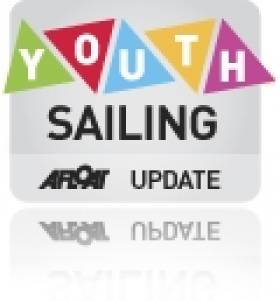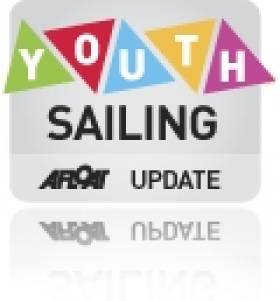Displaying items by tag: Doran
Murphy Stays in Top Ten at Youth Worlds
In spite of two thirtieth places scored in today's penultimate rounds Irish sailor Sophie Murphy stays in the top ten of the ISAF Youth Worlds in Zadar, Croatia. The Royal St George Yacht Club and Quoile Yacht Club Laser single-hander struggled in day fives stronger breezes, the first of the competiton.
Murphy can stay top ten, an important target, if she has a good final race tomorrow morning.
420 duo Emma Geary from Royal Cork Yacht Club and Niamh Connolly from Baltimore Sailing Club were definitely back on form today having been hampered by yesterday's lighter winds. The girls relished the medium breeze today placing 10th and 6th respectively in their two races. They lie 18th overall.
Philip Doran of Courtown Sailing Club and the National Yacht Club caught up to 12th place during his first race of the day but lost out on the final downwind which saw him finishing in 22nd. He fared better in his second race sitting fifth for the duration until the final mark when he was yellow flagged, the penalty saw him finish ninth leaving him 15th overall.
Meanwhile, Maxime Mazard (FRA) and Giovanni Coccoluto (ITA) go into the final day of racing at the 41st ISAF Youth Sailing World Championship in Zadar, Croatia with just one point separating them in the Laser Radial Boys fleet.
The Frenchman, who has led for the majority of the week, finished 25th and seventh today and has seen his five point overnight lead reduced to a single point after Coccoluto came seventh in Race 10 before discarding his disqualification in Race 11.
The final race tomorrow will decide who takes the gold medal home for their nation and it should be a fascinating finale.
RYA Volvo Team GBR sailor Cameron Douglas shone in the breeze today finishing with a bullet and a second place, he said, “It was an awesome day. We had a bit of breeze for the first time this week so I’m very happy. It has been a really great event.”
Australia’s Matthew Wearn won the days other race but did not finish Race 11 and is down in 26th place and Žan-Luka Zelko is third on 114 points trailing Mazard by eight points.
In the Laser Radial Girls Erika Reineke (USA) also finished with a race win and a second place. The American, who is a full time member of US SAILING’s Team Alphagraphics, said, “I liked today a lot better. There was a little bit of breeze and there was some nice waves. I was pretty far away from the gold today, 19 points, and I think I caught up a bit. I’m just going to go out and try my hardest tomorrow and try to win.”
Tiril Bue regained the lead in the Radial Girls fleet after she was consistent in the breeze finishing third in Race 10 and fourth in Race 11. Overnight leader Paulina Czubachowska came through in 10th and 11th today and has dropped to third overall. Manami Doi (JPN) maintains her second place overall but just two points separate Doi, Czubachowska and Reineke so it should be an interesting climax.
And like the Laser Radial Boys it will be winner takes all between Veronica Fanciulli (ITA) and Siripon Kaewduang-Ngam (THA) with just one point separating the pair in the RS:X Girls. Fanciulli went 2-4 today and Kaewduang-Ngam finished third and recorded a bullet to pull the overnight deficit down to a single point. Naomi Cohen (ISR) is third on 32 points and Agnieszka Bilska (POL), who claimed the days other bullet, is fourth on 36 points.
With three bullets today Louis Giard has leapt into second place in the RS:X Boys on 36 points. But Cho Wonwoo (KOR) continues to lead and will take a six point advantage into the final day following three RS:X races today. The Korean finished 2-4-6 today. Spain’s Mateo Sanz had a minor dent in his scorecard today following a tenth place in Race 9 but bounced back with a third and second. He is third overall on 37 points.
Morgan Kiss and Christina Lewis (USA) closed the gap on 420 leaders Lara Vadlau and Tanja Frank (AUT) to four points ahead of the final day. The Americans finished 4-5 today compared to the Austrians 8-2. Nikole Barnes and Agustina Barbuto (ISV) retain their third place following two seventh place finishes today. Today’s race wins went to Carrie Smith and Ella Clark (AUS) and Maelenn Lamaitre and Aloise Retornaz (FRA).
2010 ISAF Youth Worlds gold medallist Jordi Xammer with new crew Alex Claville regained the lead in the 420 Boys following a tenth and fourth place finish. They lead Japan’s Daichi Mototsu and Yuki Hino by eleven points. Angus Galloway and Alexander Gough (AUS) stay in third place going into the final day and have a two point advantage over Guillaume Pirouelle and Valentin Sipan (AUS)
In the SL16 Brazil’s Martin Lowy and Kim Andrade take a 13 point lead into the final day after they came eighth twice today. And with a fleet of 14, the boys from Brazil will need to sail a steady race tomorrow to seal the deal. Nicolaj Bjornholt Christiansen and Daniel Bjornholt Christiansen (DEN) had a good day coming second and third and are second overall on 37 points. And Great Britain’s Rupert White and Nikola Boniface are third on 48 points.
Carlos Robles and Florian Trittel have an impressive 19 point lead ahead of the final day after a bullet and a sixth place finish in the 29er. The Spaniards have only finished out of the top six twice and with a string of consistent results it would be hard to bet against the Spaniards claiming gold. The race for second place is interesting with Max Deckers and Annette Duetz (NED) on 51 points, Antoine Screve and Max Agnese (USA) on 53 points and Josh Franklin and Lewis Brake (AUS) on 56 points. The days other race win went the way of France’s Gael Jaffrezic and Julien Bloyet who are down in eighth place.
One race in each fleet will take place tomorrow to decide the medals and racing begins at 12:00 local time.
Doran Fourth at ISAF Youth Worlds
Wexford's Philip Doran lies fourth overall after an impressive opening two rounds at the 41st ISAF Youth Sailing World Championship in Zadar, Croatia.
Doran who is sailing in the Boys Laser Radial class has scored a 7 and 12 to be three points off third overall in his fifty boat fleet.
Sophie Murphy sailing in the Girls Laser Radial fleet is 19th after a single race in her fleet of 41.
The third Irish boat sailed by Emma Geary and Niamh Connolly, in the girls double handed 420 class, is 14th from 32 countries.
More from ISAF:
Boys 420 ISAF Athlete Participation Programme sailors Raul Rios and Fernando Monllor (PUR) ended the opening day of sailing at the top of the leader board.
The boys, who are benefitting from the coaching of World Youth Sailing Trust coach, Hugh Styles (GBR), ended Race 1 in eleventh place before claiming the bullet in Race 2.
And the Puerto Rican duo were delighted with their performance. Rios said, "It was pretty light and shifty and it was my first bullet. It is a great feeling, this is my third ISAF Youth Worlds and I've struggled a lot in the other two and this one we're really prepared."
And Monllor added, "It was a very nice. Sailing with Raul has been really good and a great experience, he is a really good sailor and having the opportunity to sail with him has been a great pleasure."
Tied on equal points with the Puerto Rican duo is Brazil's Ricardo Paranhos and Patrick Essle. The boys from Brazil finished 4-8 after the opening day of sailing. The Netherlands Floris van de Werkwn and Laurens van dev Werken are third on 13 points tied with Juan Manuel Garcia Rodriguez and Facundo Mario Olezza Bazan (ARG).
Japan's Daichi Mototsu and Yuki Hino won the opening race in Zadar but came 19th in Race 2 to end day one down in ninth overall.
The 420 Girls were the last off the water at 18:30 local time and only managed to fit in one race due to very light winds. Great Britain's Jessica Lavery and Georgina Morthesele won Race 1 followed by Austria's Lara Vadlau and Tanja Frank. Poland's Julia Rokosz and Joanna Szopinska finished third.
The 23-boat 29er fleet saw Carlos Robles and Florian Trittel (ESP) and Norway's Anders Kippenberg and Emil Mellbye claim the day's bullets. But it was the Spaniards who finished the day at the top of the leader board after finishing fourth in Race 2.
The Norwegians had a poor start finishing 17th in Race 1 but bounced back with the bullet in Race 2. They sit eighth.
Max Deckers and Annette Duetz (NED) came ninth and second in the two races today and are six points behind the Spanish 29er pair. America's Antoine Screve and Max Agnese finished 6-5 to end the opening day of sailing in Zadar in third place.
New Zealand's Tomer Simhony and Ellie Louise Copeland lead the SL16 following their bullet in Race 1 and third place finish in Race 2. Belgium's Phillip Hendrickx and Victor Klaas trail the Kiwis by five points. The Belgian sailors finished 4-5 today and Spain's Jordi Booth and Pau Dengra are in third after coming in second behind the Kiwis in Race 1 and finishing ninth in Race 2.
Brazil's Martin Lowy and Kim Andrade retired after the finish in Race 1, but the Brazilians bounced back with a bullet in Race 2 to end the day in ninth.
In the Laser Radial Boys, Maxime Mazard (FRA) had a fantastic day finishing with a third and second place to lead overall on five points. Terence Choo (SIN) came second in Race 1 and finished 13th in Race 2. One point behind in third place is Oz Adam (ISR) who went 12-4 today.
Mazard takes a ten point lead into the second day of sailing but with a lot of racing to come the Frenchman won't be getting carried away.
Only one race was possible in the Laser Radial Girls as the wind died throughout the day. The race win went to Hong Kong's Erica Hok Yan Leung. Sandy Fauthoux (FRA) came through in second ahead of Erika Reineke (USA).
The RS:X Boys and Girls were only able to fit one race in as well. Louis Giard (FRA) won the RS:X Boys race ahead of ISAF APP sailor Cho Wonwoo (KOR). Italy's Mattia Camboni (ITA) finished third.
And in the RS:X Girls Camboni's Italian team mate Veronica Fanciulli claimed the bullet. Agnieszka Bilksa (POL) came second and Israel's Naomi Cohen finished third.
Singapore 2010 Youth Olympic Games gold medallist Siripon Kaewduang – Ngam finished fourth and bronze medallist Audrey Yong (SIN) finished sixth.































































